MBA505: Review of Coaching and Mentoring Skills and Experiences
VerifiedAdded on 2022/08/18
|8
|2375
|16
Report
AI Summary
This report is a reflection on a student's experience with coaching and mentoring, focusing on three workshops where they took on the roles of coach, trainee, and observer. The student explores the responsibilities and skills required for each role, including active listening, questioning, and providing constructive feedback as a coach. The GROW model is analyzed, highlighting its application in setting goals, assessing reality, identifying obstacles, and defining the way forward. As a trainee, the student reflects on the importance of learning office functions and policies. The observer's role in planning, research, and program implementation is also considered, alongside the use of radial diagrams and SWOT analysis. The student aims to apply these learnings to their goal of becoming an executive officer in healthcare administration.
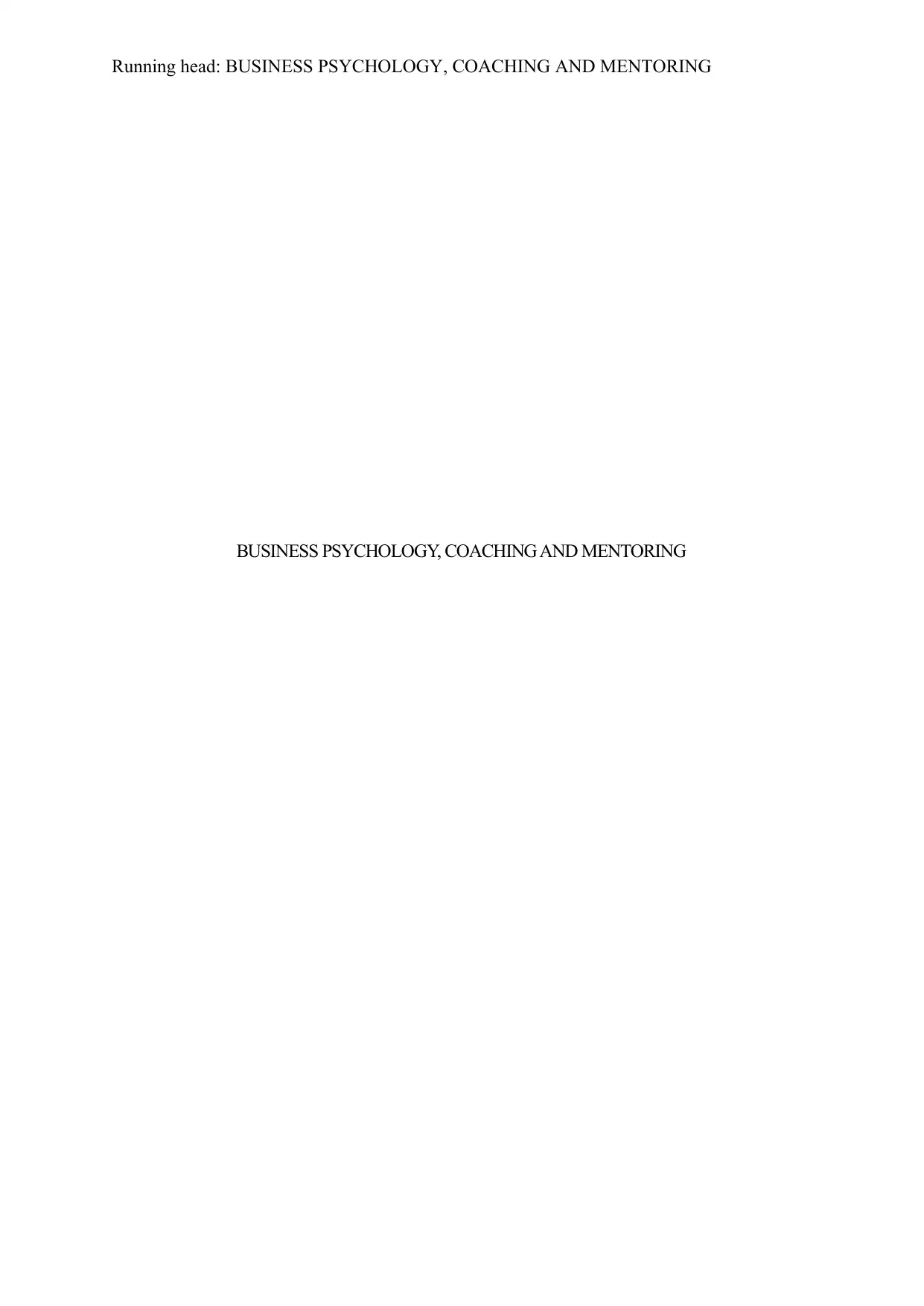
Running head: BUSINESS PSYCHOLOGY, COACHING AND MENTORING
BUSINESS PSYCHOLOGY, COACHING AND MENTORING
BUSINESS PSYCHOLOGY, COACHING AND MENTORING
Paraphrase This Document
Need a fresh take? Get an instant paraphrase of this document with our AI Paraphraser
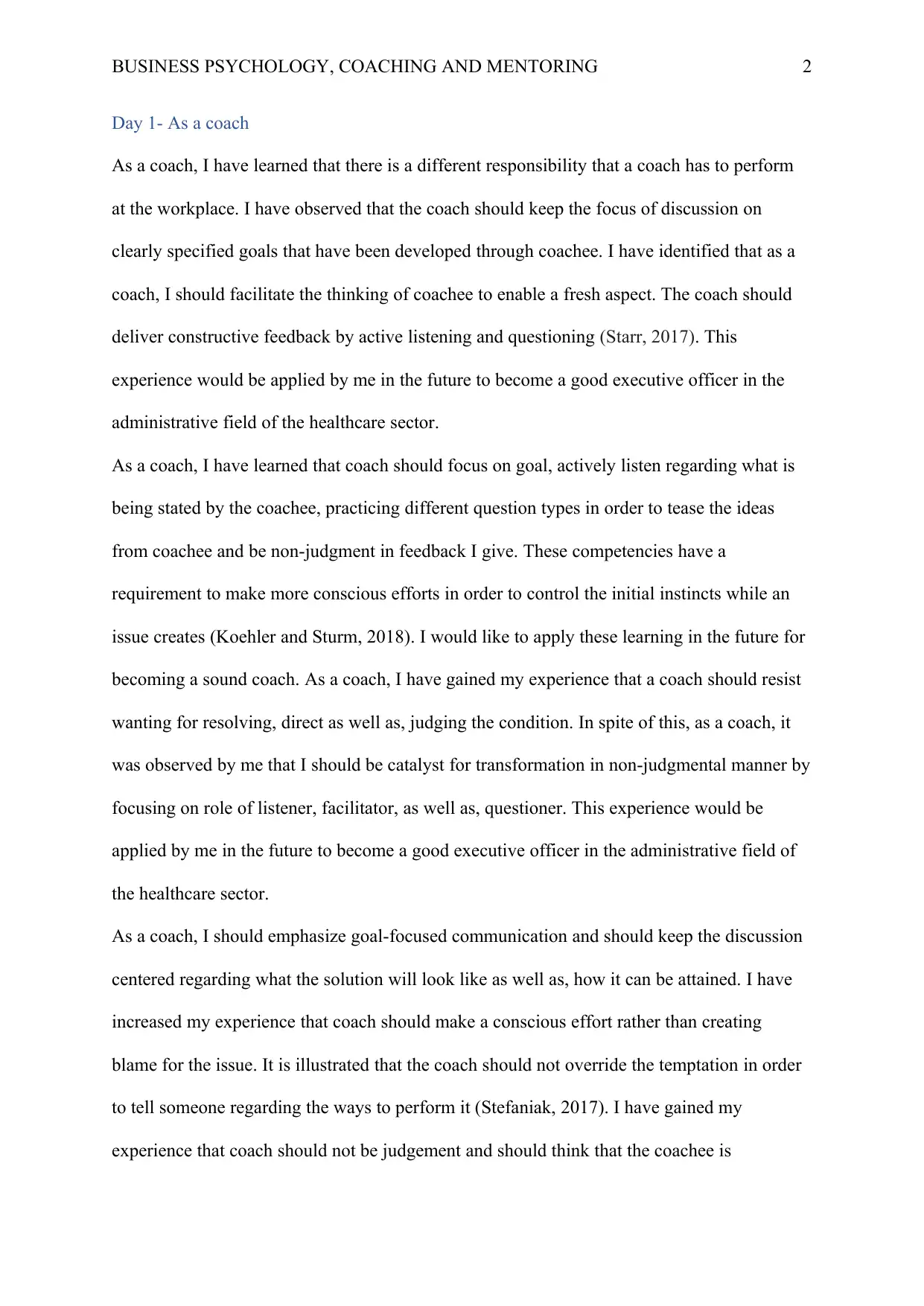
BUSINESS PSYCHOLOGY, COACHING AND MENTORING 2
Day 1- As a coach
As a coach, I have learned that there is a different responsibility that a coach has to perform
at the workplace. I have observed that the coach should keep the focus of discussion on
clearly specified goals that have been developed through coachee. I have identified that as a
coach, I should facilitate the thinking of coachee to enable a fresh aspect. The coach should
deliver constructive feedback by active listening and questioning (Starr, 2017). This
experience would be applied by me in the future to become a good executive officer in the
administrative field of the healthcare sector.
As a coach, I have learned that coach should focus on goal, actively listen regarding what is
being stated by the coachee, practicing different question types in order to tease the ideas
from coachee and be non-judgment in feedback I give. These competencies have a
requirement to make more conscious efforts in order to control the initial instincts while an
issue creates (Koehler and Sturm, 2018). I would like to apply these learning in the future for
becoming a sound coach. As a coach, I have gained my experience that a coach should resist
wanting for resolving, direct as well as, judging the condition. In spite of this, as a coach, it
was observed by me that I should be catalyst for transformation in non-judgmental manner by
focusing on role of listener, facilitator, as well as, questioner. This experience would be
applied by me in the future to become a good executive officer in the administrative field of
the healthcare sector.
As a coach, I should emphasize goal-focused communication and should keep the discussion
centered regarding what the solution will look like as well as, how it can be attained. I have
increased my experience that coach should make a conscious effort rather than creating
blame for the issue. It is illustrated that the coach should not override the temptation in order
to tell someone regarding the ways to perform it (Stefaniak, 2017). I have gained my
experience that coach should not be judgement and should think that the coachee is
Day 1- As a coach
As a coach, I have learned that there is a different responsibility that a coach has to perform
at the workplace. I have observed that the coach should keep the focus of discussion on
clearly specified goals that have been developed through coachee. I have identified that as a
coach, I should facilitate the thinking of coachee to enable a fresh aspect. The coach should
deliver constructive feedback by active listening and questioning (Starr, 2017). This
experience would be applied by me in the future to become a good executive officer in the
administrative field of the healthcare sector.
As a coach, I have learned that coach should focus on goal, actively listen regarding what is
being stated by the coachee, practicing different question types in order to tease the ideas
from coachee and be non-judgment in feedback I give. These competencies have a
requirement to make more conscious efforts in order to control the initial instincts while an
issue creates (Koehler and Sturm, 2018). I would like to apply these learning in the future for
becoming a sound coach. As a coach, I have gained my experience that a coach should resist
wanting for resolving, direct as well as, judging the condition. In spite of this, as a coach, it
was observed by me that I should be catalyst for transformation in non-judgmental manner by
focusing on role of listener, facilitator, as well as, questioner. This experience would be
applied by me in the future to become a good executive officer in the administrative field of
the healthcare sector.
As a coach, I should emphasize goal-focused communication and should keep the discussion
centered regarding what the solution will look like as well as, how it can be attained. I have
increased my experience that coach should make a conscious effort rather than creating
blame for the issue. It is illustrated that the coach should not override the temptation in order
to tell someone regarding the ways to perform it (Stefaniak, 2017). I have gained my
experience that coach should not be judgement and should think that the coachee is
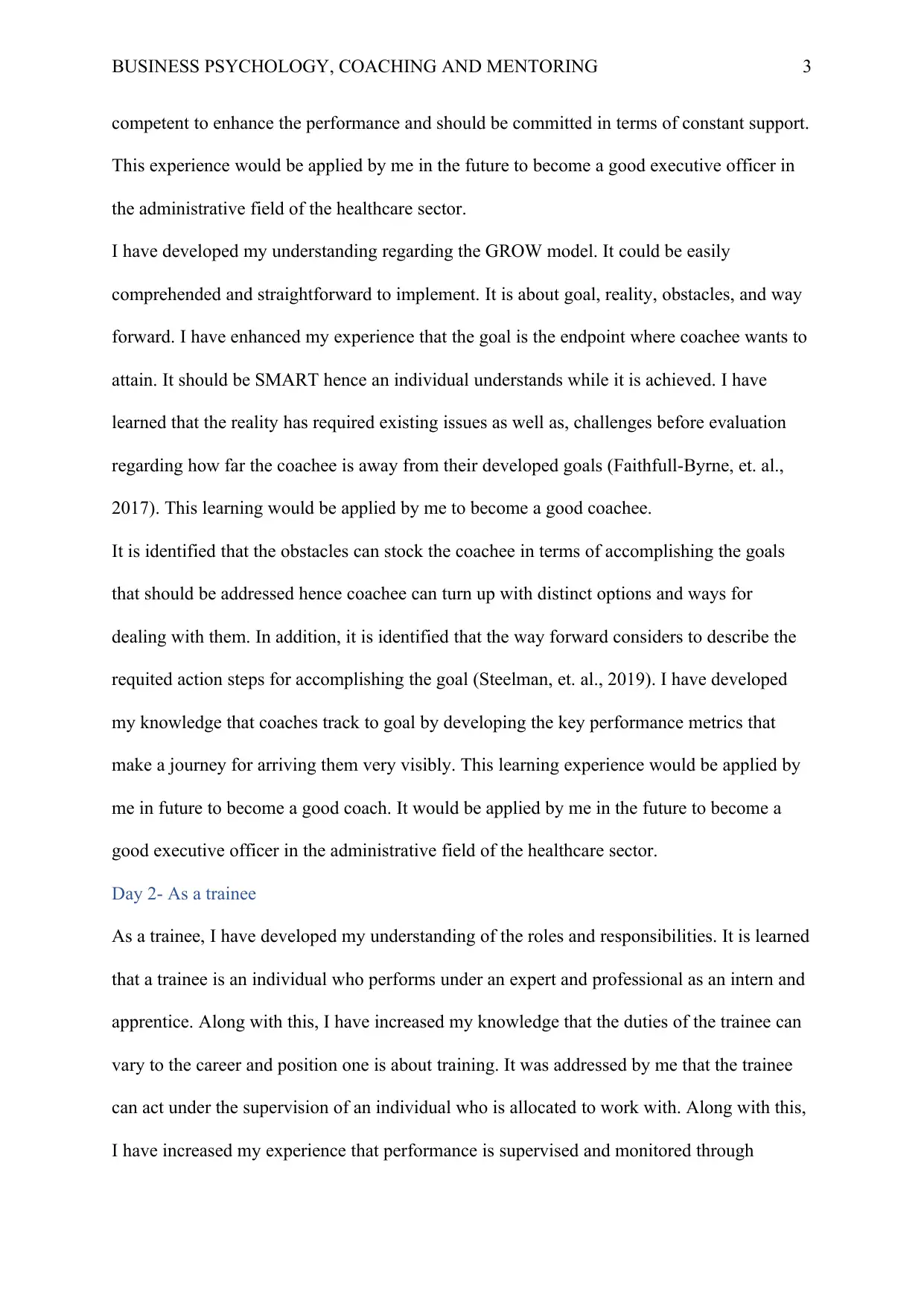
BUSINESS PSYCHOLOGY, COACHING AND MENTORING 3
competent to enhance the performance and should be committed in terms of constant support.
This experience would be applied by me in the future to become a good executive officer in
the administrative field of the healthcare sector.
I have developed my understanding regarding the GROW model. It could be easily
comprehended and straightforward to implement. It is about goal, reality, obstacles, and way
forward. I have enhanced my experience that the goal is the endpoint where coachee wants to
attain. It should be SMART hence an individual understands while it is achieved. I have
learned that the reality has required existing issues as well as, challenges before evaluation
regarding how far the coachee is away from their developed goals (Faithfull-Byrne, et. al.,
2017). This learning would be applied by me to become a good coachee.
It is identified that the obstacles can stock the coachee in terms of accomplishing the goals
that should be addressed hence coachee can turn up with distinct options and ways for
dealing with them. In addition, it is identified that the way forward considers to describe the
requited action steps for accomplishing the goal (Steelman, et. al., 2019). I have developed
my knowledge that coaches track to goal by developing the key performance metrics that
make a journey for arriving them very visibly. This learning experience would be applied by
me in future to become a good coach. It would be applied by me in the future to become a
good executive officer in the administrative field of the healthcare sector.
Day 2- As a trainee
As a trainee, I have developed my understanding of the roles and responsibilities. It is learned
that a trainee is an individual who performs under an expert and professional as an intern and
apprentice. Along with this, I have increased my knowledge that the duties of the trainee can
vary to the career and position one is about training. It was addressed by me that the trainee
can act under the supervision of an individual who is allocated to work with. Along with this,
I have increased my experience that performance is supervised and monitored through
competent to enhance the performance and should be committed in terms of constant support.
This experience would be applied by me in the future to become a good executive officer in
the administrative field of the healthcare sector.
I have developed my understanding regarding the GROW model. It could be easily
comprehended and straightforward to implement. It is about goal, reality, obstacles, and way
forward. I have enhanced my experience that the goal is the endpoint where coachee wants to
attain. It should be SMART hence an individual understands while it is achieved. I have
learned that the reality has required existing issues as well as, challenges before evaluation
regarding how far the coachee is away from their developed goals (Faithfull-Byrne, et. al.,
2017). This learning would be applied by me to become a good coachee.
It is identified that the obstacles can stock the coachee in terms of accomplishing the goals
that should be addressed hence coachee can turn up with distinct options and ways for
dealing with them. In addition, it is identified that the way forward considers to describe the
requited action steps for accomplishing the goal (Steelman, et. al., 2019). I have developed
my knowledge that coaches track to goal by developing the key performance metrics that
make a journey for arriving them very visibly. This learning experience would be applied by
me in future to become a good coach. It would be applied by me in the future to become a
good executive officer in the administrative field of the healthcare sector.
Day 2- As a trainee
As a trainee, I have developed my understanding of the roles and responsibilities. It is learned
that a trainee is an individual who performs under an expert and professional as an intern and
apprentice. Along with this, I have increased my knowledge that the duties of the trainee can
vary to the career and position one is about training. It was addressed by me that the trainee
can act under the supervision of an individual who is allocated to work with. Along with this,
I have increased my experience that performance is supervised and monitored through
⊘ This is a preview!⊘
Do you want full access?
Subscribe today to unlock all pages.

Trusted by 1+ million students worldwide
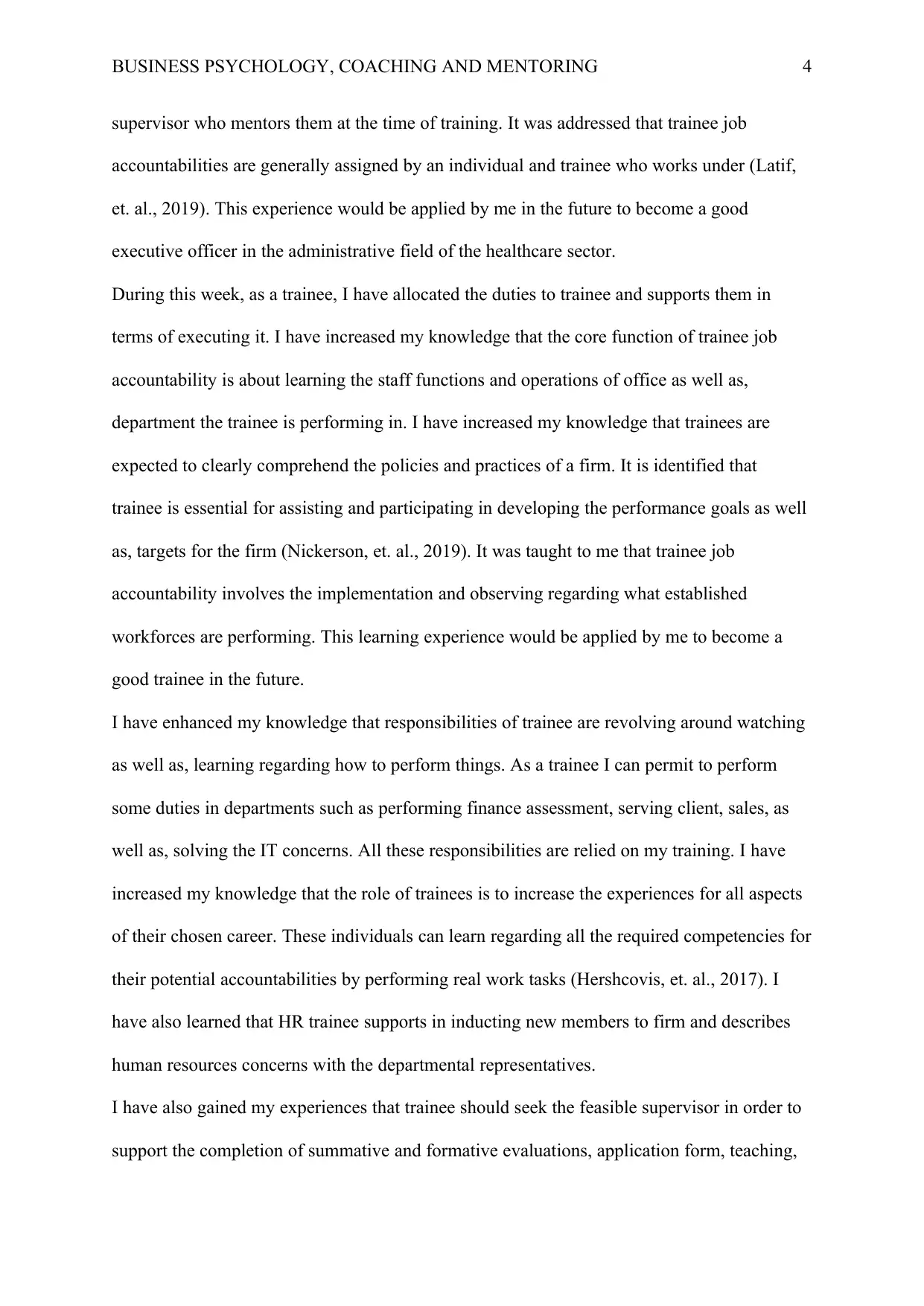
BUSINESS PSYCHOLOGY, COACHING AND MENTORING 4
supervisor who mentors them at the time of training. It was addressed that trainee job
accountabilities are generally assigned by an individual and trainee who works under (Latif,
et. al., 2019). This experience would be applied by me in the future to become a good
executive officer in the administrative field of the healthcare sector.
During this week, as a trainee, I have allocated the duties to trainee and supports them in
terms of executing it. I have increased my knowledge that the core function of trainee job
accountability is about learning the staff functions and operations of office as well as,
department the trainee is performing in. I have increased my knowledge that trainees are
expected to clearly comprehend the policies and practices of a firm. It is identified that
trainee is essential for assisting and participating in developing the performance goals as well
as, targets for the firm (Nickerson, et. al., 2019). It was taught to me that trainee job
accountability involves the implementation and observing regarding what established
workforces are performing. This learning experience would be applied by me to become a
good trainee in the future.
I have enhanced my knowledge that responsibilities of trainee are revolving around watching
as well as, learning regarding how to perform things. As a trainee I can permit to perform
some duties in departments such as performing finance assessment, serving client, sales, as
well as, solving the IT concerns. All these responsibilities are relied on my training. I have
increased my knowledge that the role of trainees is to increase the experiences for all aspects
of their chosen career. These individuals can learn regarding all the required competencies for
their potential accountabilities by performing real work tasks (Hershcovis, et. al., 2017). I
have also learned that HR trainee supports in inducting new members to firm and describes
human resources concerns with the departmental representatives.
I have also gained my experiences that trainee should seek the feasible supervisor in order to
support the completion of summative and formative evaluations, application form, teaching,
supervisor who mentors them at the time of training. It was addressed that trainee job
accountabilities are generally assigned by an individual and trainee who works under (Latif,
et. al., 2019). This experience would be applied by me in the future to become a good
executive officer in the administrative field of the healthcare sector.
During this week, as a trainee, I have allocated the duties to trainee and supports them in
terms of executing it. I have increased my knowledge that the core function of trainee job
accountability is about learning the staff functions and operations of office as well as,
department the trainee is performing in. I have increased my knowledge that trainees are
expected to clearly comprehend the policies and practices of a firm. It is identified that
trainee is essential for assisting and participating in developing the performance goals as well
as, targets for the firm (Nickerson, et. al., 2019). It was taught to me that trainee job
accountability involves the implementation and observing regarding what established
workforces are performing. This learning experience would be applied by me to become a
good trainee in the future.
I have enhanced my knowledge that responsibilities of trainee are revolving around watching
as well as, learning regarding how to perform things. As a trainee I can permit to perform
some duties in departments such as performing finance assessment, serving client, sales, as
well as, solving the IT concerns. All these responsibilities are relied on my training. I have
increased my knowledge that the role of trainees is to increase the experiences for all aspects
of their chosen career. These individuals can learn regarding all the required competencies for
their potential accountabilities by performing real work tasks (Hershcovis, et. al., 2017). I
have also learned that HR trainee supports in inducting new members to firm and describes
human resources concerns with the departmental representatives.
I have also gained my experiences that trainee should seek the feasible supervisor in order to
support the completion of summative and formative evaluations, application form, teaching,
Paraphrase This Document
Need a fresh take? Get an instant paraphrase of this document with our AI Paraphraser
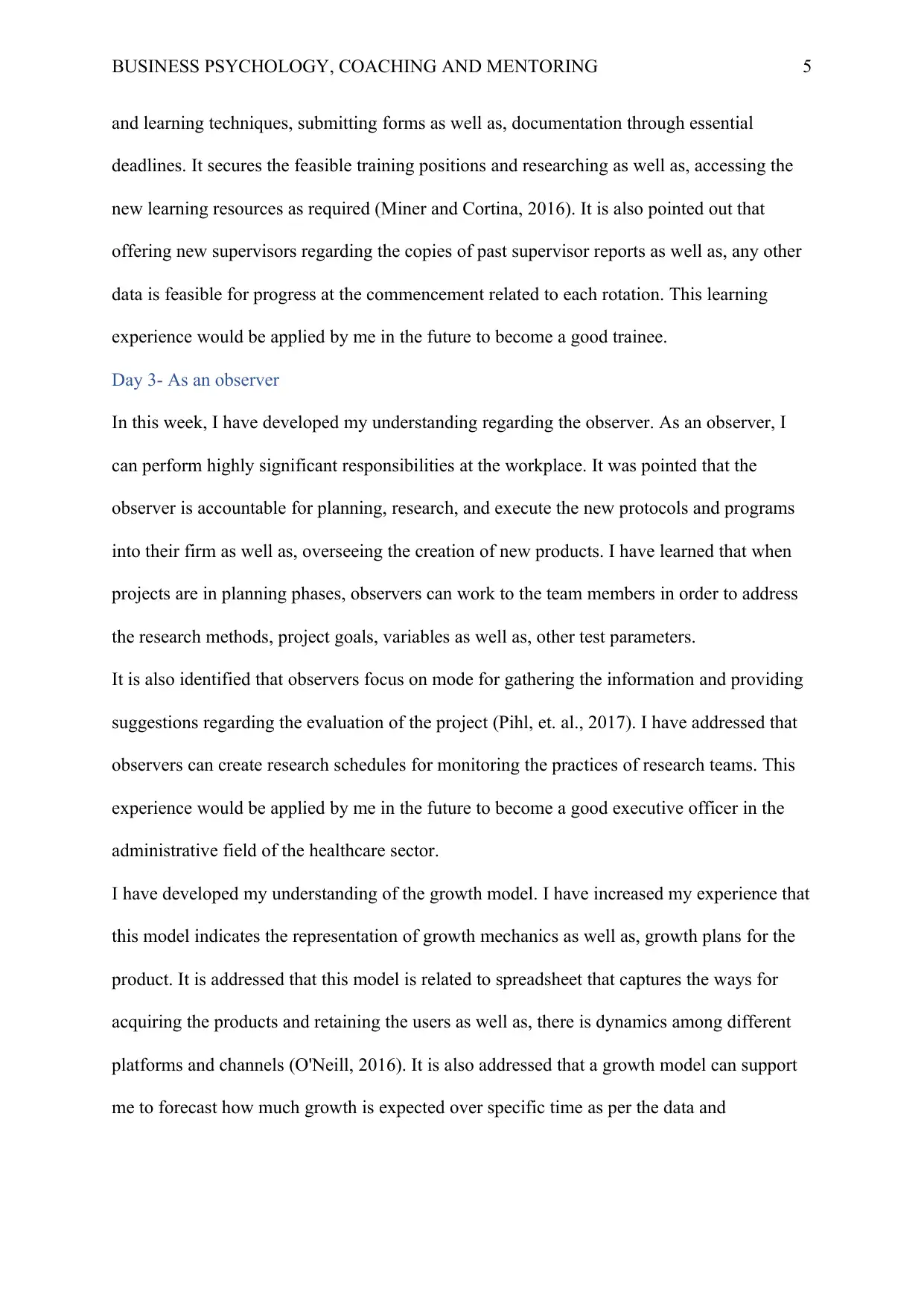
BUSINESS PSYCHOLOGY, COACHING AND MENTORING 5
and learning techniques, submitting forms as well as, documentation through essential
deadlines. It secures the feasible training positions and researching as well as, accessing the
new learning resources as required (Miner and Cortina, 2016). It is also pointed out that
offering new supervisors regarding the copies of past supervisor reports as well as, any other
data is feasible for progress at the commencement related to each rotation. This learning
experience would be applied by me in the future to become a good trainee.
Day 3- As an observer
In this week, I have developed my understanding regarding the observer. As an observer, I
can perform highly significant responsibilities at the workplace. It was pointed that the
observer is accountable for planning, research, and execute the new protocols and programs
into their firm as well as, overseeing the creation of new products. I have learned that when
projects are in planning phases, observers can work to the team members in order to address
the research methods, project goals, variables as well as, other test parameters.
It is also identified that observers focus on mode for gathering the information and providing
suggestions regarding the evaluation of the project (Pihl, et. al., 2017). I have addressed that
observers can create research schedules for monitoring the practices of research teams. This
experience would be applied by me in the future to become a good executive officer in the
administrative field of the healthcare sector.
I have developed my understanding of the growth model. I have increased my experience that
this model indicates the representation of growth mechanics as well as, growth plans for the
product. It is addressed that this model is related to spreadsheet that captures the ways for
acquiring the products and retaining the users as well as, there is dynamics among different
platforms and channels (O'Neill, 2016). It is also addressed that a growth model can support
me to forecast how much growth is expected over specific time as per the data and
and learning techniques, submitting forms as well as, documentation through essential
deadlines. It secures the feasible training positions and researching as well as, accessing the
new learning resources as required (Miner and Cortina, 2016). It is also pointed out that
offering new supervisors regarding the copies of past supervisor reports as well as, any other
data is feasible for progress at the commencement related to each rotation. This learning
experience would be applied by me in the future to become a good trainee.
Day 3- As an observer
In this week, I have developed my understanding regarding the observer. As an observer, I
can perform highly significant responsibilities at the workplace. It was pointed that the
observer is accountable for planning, research, and execute the new protocols and programs
into their firm as well as, overseeing the creation of new products. I have learned that when
projects are in planning phases, observers can work to the team members in order to address
the research methods, project goals, variables as well as, other test parameters.
It is also identified that observers focus on mode for gathering the information and providing
suggestions regarding the evaluation of the project (Pihl, et. al., 2017). I have addressed that
observers can create research schedules for monitoring the practices of research teams. This
experience would be applied by me in the future to become a good executive officer in the
administrative field of the healthcare sector.
I have developed my understanding of the growth model. I have increased my experience that
this model indicates the representation of growth mechanics as well as, growth plans for the
product. It is addressed that this model is related to spreadsheet that captures the ways for
acquiring the products and retaining the users as well as, there is dynamics among different
platforms and channels (O'Neill, 2016). It is also addressed that a growth model can support
me to forecast how much growth is expected over specific time as per the data and
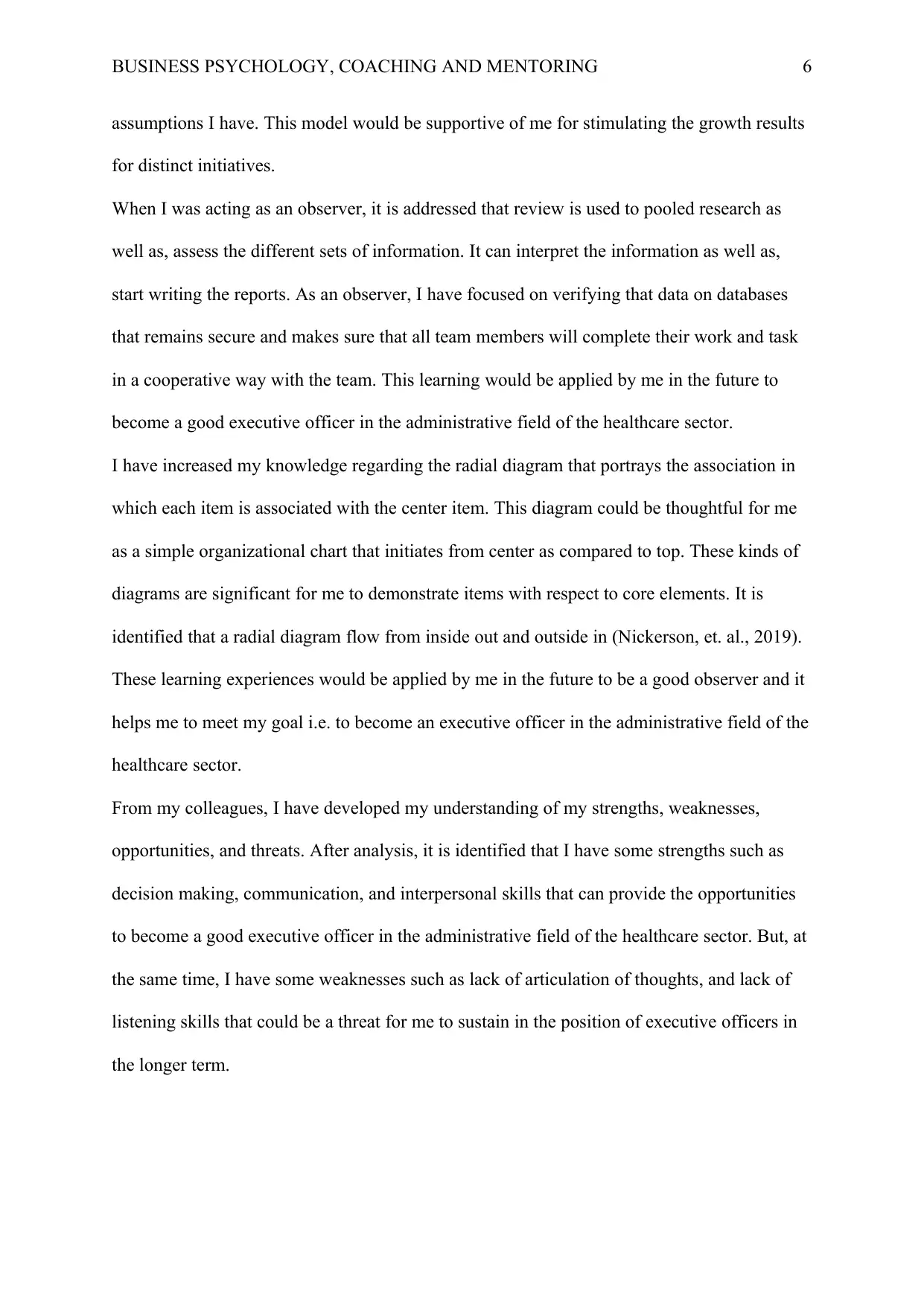
BUSINESS PSYCHOLOGY, COACHING AND MENTORING 6
assumptions I have. This model would be supportive of me for stimulating the growth results
for distinct initiatives.
When I was acting as an observer, it is addressed that review is used to pooled research as
well as, assess the different sets of information. It can interpret the information as well as,
start writing the reports. As an observer, I have focused on verifying that data on databases
that remains secure and makes sure that all team members will complete their work and task
in a cooperative way with the team. This learning would be applied by me in the future to
become a good executive officer in the administrative field of the healthcare sector.
I have increased my knowledge regarding the radial diagram that portrays the association in
which each item is associated with the center item. This diagram could be thoughtful for me
as a simple organizational chart that initiates from center as compared to top. These kinds of
diagrams are significant for me to demonstrate items with respect to core elements. It is
identified that a radial diagram flow from inside out and outside in (Nickerson, et. al., 2019).
These learning experiences would be applied by me in the future to be a good observer and it
helps me to meet my goal i.e. to become an executive officer in the administrative field of the
healthcare sector.
From my colleagues, I have developed my understanding of my strengths, weaknesses,
opportunities, and threats. After analysis, it is identified that I have some strengths such as
decision making, communication, and interpersonal skills that can provide the opportunities
to become a good executive officer in the administrative field of the healthcare sector. But, at
the same time, I have some weaknesses such as lack of articulation of thoughts, and lack of
listening skills that could be a threat for me to sustain in the position of executive officers in
the longer term.
assumptions I have. This model would be supportive of me for stimulating the growth results
for distinct initiatives.
When I was acting as an observer, it is addressed that review is used to pooled research as
well as, assess the different sets of information. It can interpret the information as well as,
start writing the reports. As an observer, I have focused on verifying that data on databases
that remains secure and makes sure that all team members will complete their work and task
in a cooperative way with the team. This learning would be applied by me in the future to
become a good executive officer in the administrative field of the healthcare sector.
I have increased my knowledge regarding the radial diagram that portrays the association in
which each item is associated with the center item. This diagram could be thoughtful for me
as a simple organizational chart that initiates from center as compared to top. These kinds of
diagrams are significant for me to demonstrate items with respect to core elements. It is
identified that a radial diagram flow from inside out and outside in (Nickerson, et. al., 2019).
These learning experiences would be applied by me in the future to be a good observer and it
helps me to meet my goal i.e. to become an executive officer in the administrative field of the
healthcare sector.
From my colleagues, I have developed my understanding of my strengths, weaknesses,
opportunities, and threats. After analysis, it is identified that I have some strengths such as
decision making, communication, and interpersonal skills that can provide the opportunities
to become a good executive officer in the administrative field of the healthcare sector. But, at
the same time, I have some weaknesses such as lack of articulation of thoughts, and lack of
listening skills that could be a threat for me to sustain in the position of executive officers in
the longer term.
⊘ This is a preview!⊘
Do you want full access?
Subscribe today to unlock all pages.

Trusted by 1+ million students worldwide
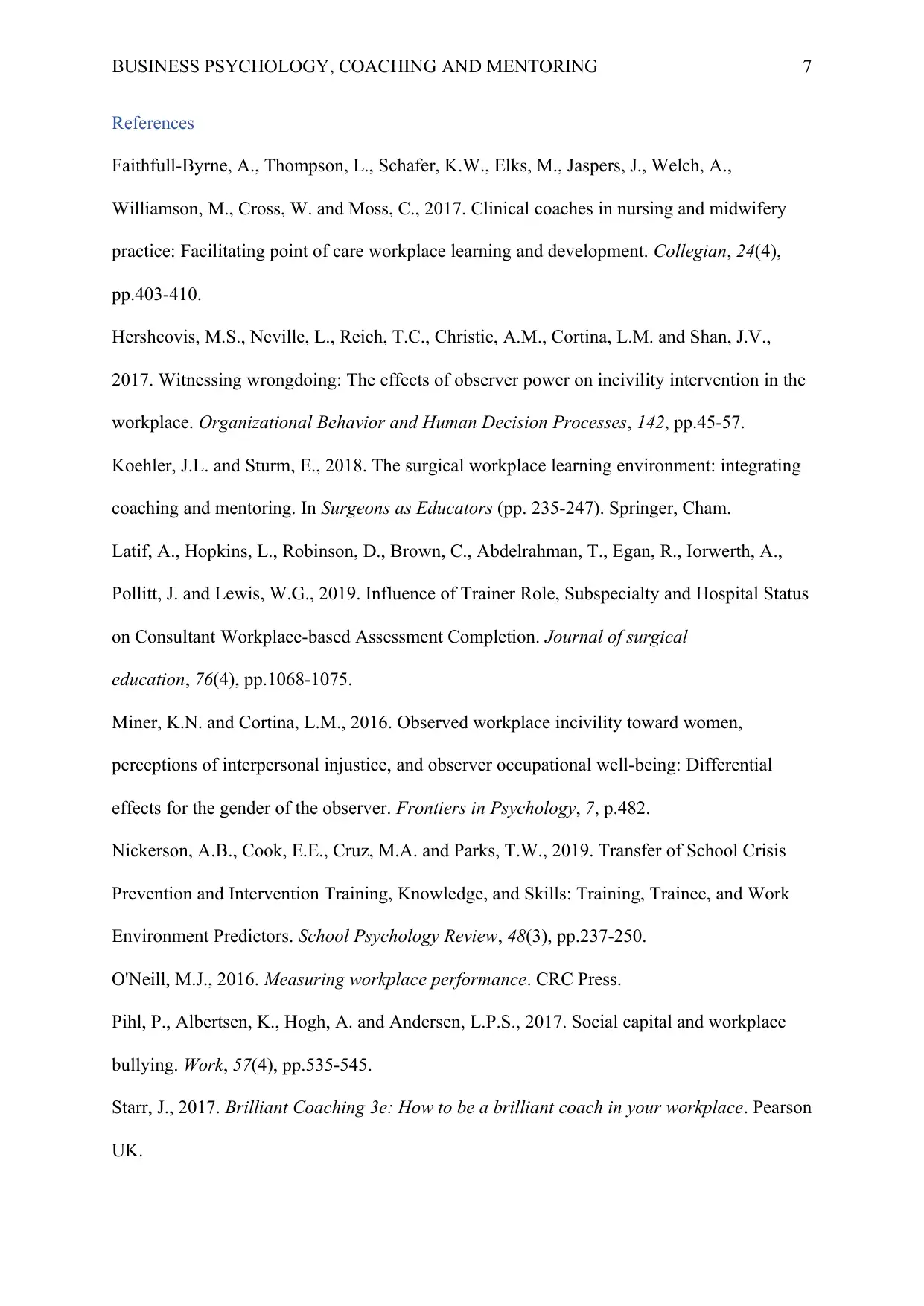
BUSINESS PSYCHOLOGY, COACHING AND MENTORING 7
References
Faithfull-Byrne, A., Thompson, L., Schafer, K.W., Elks, M., Jaspers, J., Welch, A.,
Williamson, M., Cross, W. and Moss, C., 2017. Clinical coaches in nursing and midwifery
practice: Facilitating point of care workplace learning and development. Collegian, 24(4),
pp.403-410.
Hershcovis, M.S., Neville, L., Reich, T.C., Christie, A.M., Cortina, L.M. and Shan, J.V.,
2017. Witnessing wrongdoing: The effects of observer power on incivility intervention in the
workplace. Organizational Behavior and Human Decision Processes, 142, pp.45-57.
Koehler, J.L. and Sturm, E., 2018. The surgical workplace learning environment: integrating
coaching and mentoring. In Surgeons as Educators (pp. 235-247). Springer, Cham.
Latif, A., Hopkins, L., Robinson, D., Brown, C., Abdelrahman, T., Egan, R., Iorwerth, A.,
Pollitt, J. and Lewis, W.G., 2019. Influence of Trainer Role, Subspecialty and Hospital Status
on Consultant Workplace-based Assessment Completion. Journal of surgical
education, 76(4), pp.1068-1075.
Miner, K.N. and Cortina, L.M., 2016. Observed workplace incivility toward women,
perceptions of interpersonal injustice, and observer occupational well-being: Differential
effects for the gender of the observer. Frontiers in Psychology, 7, p.482.
Nickerson, A.B., Cook, E.E., Cruz, M.A. and Parks, T.W., 2019. Transfer of School Crisis
Prevention and Intervention Training, Knowledge, and Skills: Training, Trainee, and Work
Environment Predictors. School Psychology Review, 48(3), pp.237-250.
O'Neill, M.J., 2016. Measuring workplace performance. CRC Press.
Pihl, P., Albertsen, K., Hogh, A. and Andersen, L.P.S., 2017. Social capital and workplace
bullying. Work, 57(4), pp.535-545.
Starr, J., 2017. Brilliant Coaching 3e: How to be a brilliant coach in your workplace. Pearson
UK.
References
Faithfull-Byrne, A., Thompson, L., Schafer, K.W., Elks, M., Jaspers, J., Welch, A.,
Williamson, M., Cross, W. and Moss, C., 2017. Clinical coaches in nursing and midwifery
practice: Facilitating point of care workplace learning and development. Collegian, 24(4),
pp.403-410.
Hershcovis, M.S., Neville, L., Reich, T.C., Christie, A.M., Cortina, L.M. and Shan, J.V.,
2017. Witnessing wrongdoing: The effects of observer power on incivility intervention in the
workplace. Organizational Behavior and Human Decision Processes, 142, pp.45-57.
Koehler, J.L. and Sturm, E., 2018. The surgical workplace learning environment: integrating
coaching and mentoring. In Surgeons as Educators (pp. 235-247). Springer, Cham.
Latif, A., Hopkins, L., Robinson, D., Brown, C., Abdelrahman, T., Egan, R., Iorwerth, A.,
Pollitt, J. and Lewis, W.G., 2019. Influence of Trainer Role, Subspecialty and Hospital Status
on Consultant Workplace-based Assessment Completion. Journal of surgical
education, 76(4), pp.1068-1075.
Miner, K.N. and Cortina, L.M., 2016. Observed workplace incivility toward women,
perceptions of interpersonal injustice, and observer occupational well-being: Differential
effects for the gender of the observer. Frontiers in Psychology, 7, p.482.
Nickerson, A.B., Cook, E.E., Cruz, M.A. and Parks, T.W., 2019. Transfer of School Crisis
Prevention and Intervention Training, Knowledge, and Skills: Training, Trainee, and Work
Environment Predictors. School Psychology Review, 48(3), pp.237-250.
O'Neill, M.J., 2016. Measuring workplace performance. CRC Press.
Pihl, P., Albertsen, K., Hogh, A. and Andersen, L.P.S., 2017. Social capital and workplace
bullying. Work, 57(4), pp.535-545.
Starr, J., 2017. Brilliant Coaching 3e: How to be a brilliant coach in your workplace. Pearson
UK.
Paraphrase This Document
Need a fresh take? Get an instant paraphrase of this document with our AI Paraphraser
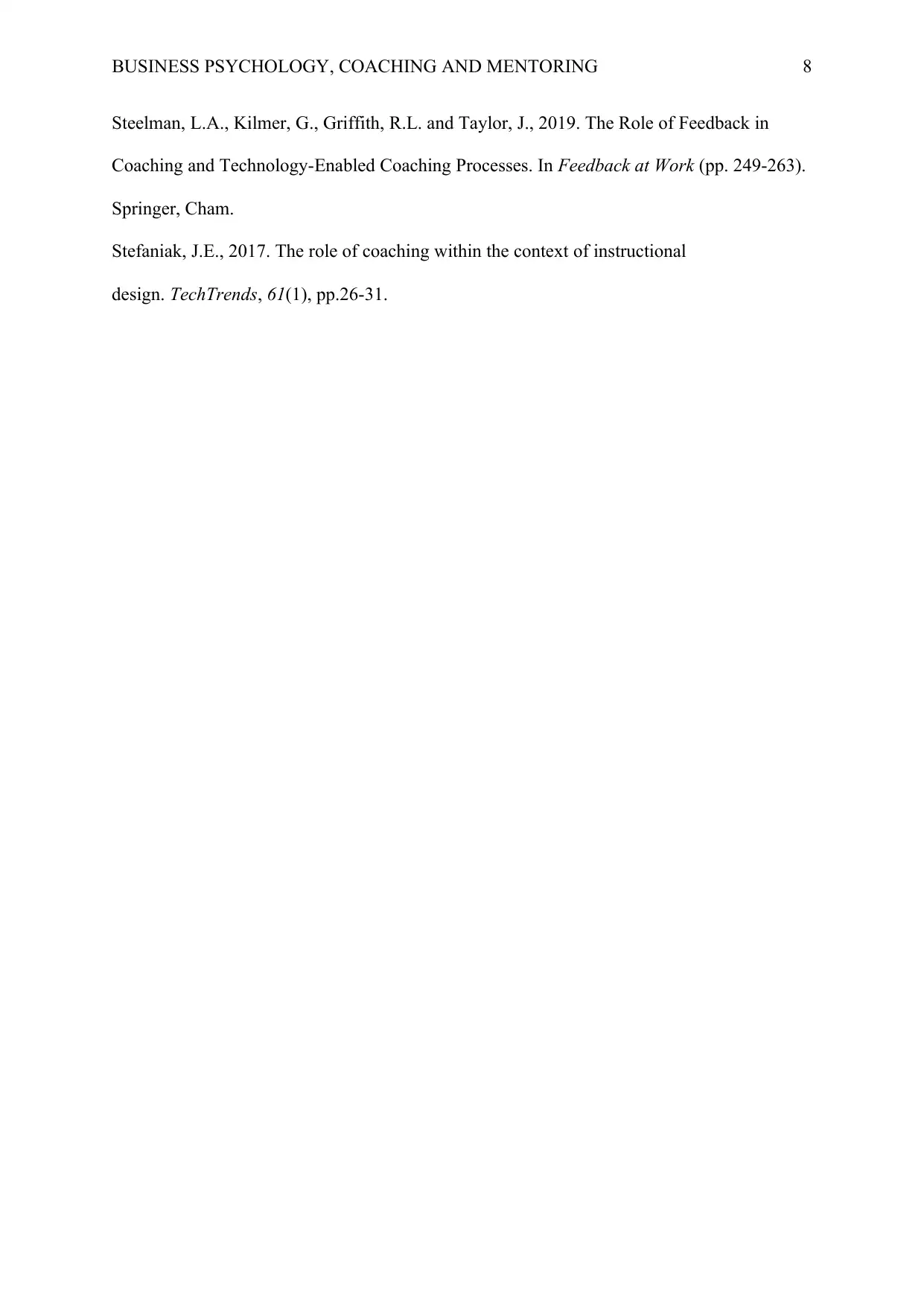
BUSINESS PSYCHOLOGY, COACHING AND MENTORING 8
Steelman, L.A., Kilmer, G., Griffith, R.L. and Taylor, J., 2019. The Role of Feedback in
Coaching and Technology-Enabled Coaching Processes. In Feedback at Work (pp. 249-263).
Springer, Cham.
Stefaniak, J.E., 2017. The role of coaching within the context of instructional
design. TechTrends, 61(1), pp.26-31.
Steelman, L.A., Kilmer, G., Griffith, R.L. and Taylor, J., 2019. The Role of Feedback in
Coaching and Technology-Enabled Coaching Processes. In Feedback at Work (pp. 249-263).
Springer, Cham.
Stefaniak, J.E., 2017. The role of coaching within the context of instructional
design. TechTrends, 61(1), pp.26-31.
1 out of 8
Related Documents
Your All-in-One AI-Powered Toolkit for Academic Success.
+13062052269
info@desklib.com
Available 24*7 on WhatsApp / Email
![[object Object]](/_next/static/media/star-bottom.7253800d.svg)
Unlock your academic potential
Copyright © 2020–2026 A2Z Services. All Rights Reserved. Developed and managed by ZUCOL.




